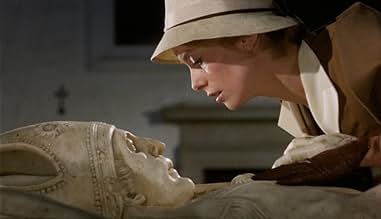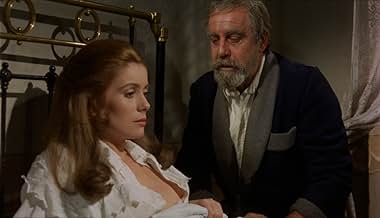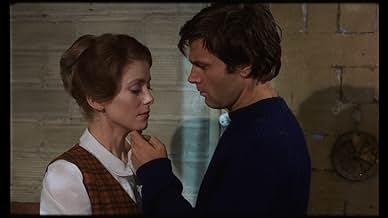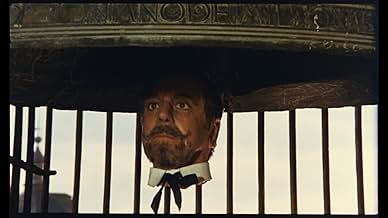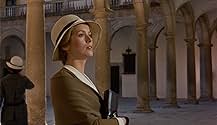Pouco depois da morte de sua mãe, uma jovem inocente encontra refúgio na casa de seu aristocrático tutor de meia-idade, que a submete a seus avanços sexuais.Pouco depois da morte de sua mãe, uma jovem inocente encontra refúgio na casa de seu aristocrático tutor de meia-idade, que a submete a seus avanços sexuais.Pouco depois da morte de sua mãe, uma jovem inocente encontra refúgio na casa de seu aristocrático tutor de meia-idade, que a submete a seus avanços sexuais.
- Direção
- Roteiristas
- Artistas
- Indicado a 1 Oscar
- 11 vitórias e 4 indicações no total
- Muchacha
- (as María Paz Pondal)
- Don Cándido
- (as Juan José Menéndez)
- Direção
- Roteiristas
- Elenco e equipe completos
- Produção, bilheteria e muito mais no IMDbPro
Avaliações em destaque
This is the sensuous story of Tristana , a drama with surrealism and sour portrait upon social classes , catholicism , sexual abuses and many other things , being stunningly realized by the Spanish maestro of surrealism , the great Luis Buñuel . This is a typical Buñuel film , as there are a lot of symbolism , social critique , including mockery or wholesale review upon religion , especially Catholicism . Luis Buñuel was given a strict Jesuit education which sowed the seeds of his obsession with both subversive behavior and religion , issues well shown in a lot of films and that would preoccupy Buñuel for the rest of his career . Here Bunuel gives a perverse studio about religion , old age , desire along with deformity ; and was strongly cut by Spanish censorship . The film describes unequal status of women , heir to a long tradition of marginalization, subjugation, exploitation and lack of rights , subsequently suffragists and protest movements emerge in pro-women . Interesting and thought-provoking screenplay from the same Luis Buñuel and Julio Alejandro , Buñuel's usual screenwriter , based on the novel by Benito Pérez Galdós ; they pull off a straight-faced treatment of shocking subject matter . Bunuel's adaptation retains the spirit of protest written by Galdos, and moved to a later time in 40 years to the novel . Nice acting by Fernando Rey as an old man who falls for the innocent girl in his charge , to the point of result to be perhaps the best performance of his long career . Rey played various Buñuel films such as The Discreet Charm of the Bourgeoisie , That Obscure object of Desire and Viridiana . And Catherine Deneuve's finest most enigmatic acting as a young cynical woman who goes to live with her guardian and subsequently turned into a bitter incapacitated cripple . The film relies heavily on the relationship between them , as is developed a rare lover/father relationship with her . One of Bunuel's most serious and serene ¨Tristana¨ is packed with surreal moments , criticism , absurd situations , masochism and nightmares . Furthermore , Buñuel satirizes and he carries out outright critical to aristocracy , bourgeoisie and attack upon religion . Pretty good support cast gives fine acting ; it is mostly formed by nice Spanish actors such as Antonio Casas , Fernando Cebrian, Jose Maria Caffarel , Antonio Ferrandis , Jose Calvo , Sergio Mendizabal , Juanjo Menendez ,among others . Beautifully shot in Toledo with a splendid cinematography by Jose Aguayo . Tristana was voted tenth best Spanish film by professionals and critics in 1996 Spanish cinema centenary and nominated for an Oscar ,film Foreign Language.
Thid wry and dramatic motion picture was compellingly directed by Luis Buñuel who was voted the 14th Greatest Director of all time . This Buñuel's strange film belongs to his French second period ; in fact , it's plenty of known Spanish actors . Born in Calanda , Aragon (1900) , Buñuel subsequently moved to Madrid to study at the university there, where his close friends included Salvador Dalí and Federico García Lorca. After moving to Paris , at the beginning Buñuel did a variety of film-related odd jobs , including working as an assistant to director Jean Epstein . With financial help from his mother and creative assistance from Dalí, he made his first film , this 17-minute "Un Chien Andalou" (1929), and immediately catapulted himself into film history thanks to its disturbing images and surrealist plot . The following year , sponsored by wealthy art patrons, he made his first picture , the scabrous witty and violent "Age of Gold" (1930), which mercilessly attacked the church and the middle classes, themes that would preoccupy Buñuel for the rest of his career . That career, though, seemed almost over by the mid-1930s, as he found work increasingly hard to come by and after the Spanish Civil War , where he made ¨Las Hurdes¨ , as Luis emigrated to the US where he worked for the Museum of Modern Art and as a film dubber for Warner Bros . He subsequently went on his Mexican period he teamed up with producer Óscar Dancigers and after a couple of unmemorable efforts shot back to international attention with the lacerating study of Mexican street urchins in ¨Los Olvidados¨ (1950), winning him the Best Director award at the Cannes Film Festival. But despite this new-found acclaim, Buñuel spent much of the next decade working on a variety of ultra-low-budget films, few of which made much impact outside Spanish-speaking countries , though many of them are well worth seeking out . As he went on filming "The Great Madcap" , ¨The brute¨, "Wuthering Heights", ¨El¨ , "The Criminal Life of Archibaldo De la Cruz" , ¨Robinson Crusoe¨ , ¨Death in the garden¨ and many others . After returning his native country, Spain, by making ¨Viridiana¨ this film was prohibited on the grounds of blasphemy as well as ¨The milky way¨ or Via Lactea , both of them were strongly prohibited by Spanish censorship . This French-Spanish final period in collaboration with producer Serge Silberman and writer Jean-Claude Carrière with notorious as well as polemic films such as ¨Viridiana¨ , ¨The Discreet Charm of the Bourgeoisie" and ¨Belle De Jour¨. His last one was the notorious ¨That obscure object of desire¨ (1977) .
Tristana, played brilliantly by Catherine Denueve, is the central character whom we see evolve from an innocent young girl with her many ideals about love and relationship, to a bitter and cynical woman at the film's end who cannot believe in anything any longer. It is with special finesse that Deneuve plays her, that we witness, with heartbreak, every turn of her back on the things she love, and every rejection of all morality that she held before.
Fernando Rey's character is probably the murkiest but ultimately most empathetic character, as at the end of the film, age wears off his hard-edged cynicism and turns him into the loving father figure that Tristana desperately needed in the beginning of the film. In a sense, it is a film about age, how when we reach a certain point in our lives we see things much clearer and as it is, rather than try to twist things to our advantage. The way Rey's character treasures the time with the vile and vindictive Tristana at the end of the film is not only overwhelmingly sad, but also an epiphany by an auteur who is gaining age himself.
In spite of all its dramatic turns of events, Tristana is not an emotional and angsty film in its portrayal of its characters' lives. Instead it is a soft and peaceful film that sympathetically accepts its characters' flaws as much as it forgives them. It is a film that evokes the intricate feeling of looking back in our dark and troubled past and finding the exquisite moments of happiness amidst all the cynicism and grit. When, towards the end, Rey reaches the peace that he has been struggling so hard to attain throughout the film, he notes, 'It's snowing so hard outside, but in this house, I'm nice and warm. What's there not to be happy about?'. A silent recognition that peace is not bending reality to your own will, but merely, acceptance.
When Tristana meets the painter Horacio (Franco Nero), they fall in love with each other and Tristana flees from Don Lope. However, years later, Horacio brings Tristana back to Don Lope with a terminal disease on her leg. She has a severed leg and survives, and Don Lope asks her hand in marriage. She accepts but now Tristana is a bitter and cynical woman and Don Lope feels the consequence of his acts in the past.
"Tristana" is a morbid tale of lost of innocence by Luis Buñuel. I had seen this film for the last time on 05 Feb 2003 and despite the wonderful performances of Catherine Deneuve and Fernando Rey, it is not among my favorite Buñuel's films. As usual, the director criticizes the Church and the bourgeois class but his famous surrealism is only presented in Tristana's nightmare. My vote is seven.
Title (Brazil): "Tristana"
One thing that's extraordinary about how Bunuel directs and allows for his actors to play the scenes is that the emotions are only heightened to a certain level, and never with the aid of things like music or tears. It is what it is: Don Lope has taken care of Tristana as her guardian since her mother died, and now has inserted himself as her father/husband figure, with his servant Saturna (stern-faced but understanding Lola Gaos) a kind of unofficial confessional. Tristana wants some freedom, just to go out and walk around, and feels caught by Don Lope even when not doing anything... until she meets Franco Nero's Don Horacio, a painter who could promise a new life. This goes without saying that one should take it for granted that Tristana isn't *that* young and could take care of herself without Lope, but maybe this is part of the point of the slight absurdity- and eventual tragedy- of this struggle.
Two years go by after she leaves Lope for Horacio, with a tumor in her leg. She's now a cripple, and now once again a kind of mental prisoner in Lope's home; the complexity of old man Lope as being duplicitous is seen right after he finds out she's sick and Horacio asks for Lope to help keep her home, and he nearly skips home saying "she'll never leave again!" All of this, leading up to a final twist that is very satisfying if extending the tragic dimension of Lope and Tristana, would be soapy and tawdry and, possibly, very standard in other hands. For Bunuel, there's a lot of personal ground here; I wonder at times if Rey is a little like one of those actors a director of Bunuel's auteur-stature uses as a means of expressing himself through an actor, or if it's just because he's so good at playing wicked AND sympathetic bourgeois. And the mixture of ideas, if not really themes, covering what's love and over-control, religion, deformity, a free will are potent and exciting even in such subtle and (as Maltin said) serenely filmed territory.
It's also a minor triumph for Deneuve, who between this and Belle de jour did some of her best work as an actress for the notorious surrealist. Her character's continual dream of Lope's beheaded top dangling from a church tower is the closest we see to a classic surrealist scene, though it's reminiscent of Los Olvidados as brilliantly expressing one character's mind-set. Deneuve is up for the challenge of putting up a tough interior and exterior presence; she gets paler towards the end (if this was for real or just a bad print I couldn't tell), and there's a lot of pain in her eyes and expression throughout. It's great work for one of the director's most subtly demanding works- beneath its conventional framework of a love-triangle story is sorrow and horror at the human condition.
Você sabia?
- CuriosidadesLuis Buñuel said that many of Tristana's idiosyncrasies, including her habit of asking people to choose between nearly identical objects, was based on the director's sister's similar habits.
- Citações
Don Lope: Poor workers. Cheated and then beaten. Work is a curse, Saturno. Down with work that you have to do to survive. That work isn't honorable, as some say. All it does is fatten the exploiting swine. However, what you do for pleasure ennobles man. If only we could all work like that. Look at me, I'd rather be hanged than work! So, I live poorly, but I live without working.
- Versões alternativasOriginally released in Europe at 105 minutes.
- Trilhas sonorasÉtude No 12 in C minor, Op 10 'Revolutionary'
Written by Frédéric Chopin
Principais escolhas
- How long is Tristana?Fornecido pela Alexa
Detalhes
- Data de lançamento
- Países de origem
- Central de atendimento oficial
- Idioma
- Também conhecido como
- Tristana
- Locações de filme
- Paseo Recaredo, Toledo, Castilla-La Mancha, Espanha(opening and closing scenes with Saturna, Viridiana and the mute boy)
- Empresas de produção
- Consulte mais créditos da empresa na IMDbPro
Bilheteria
- Faturamento bruto nos EUA e Canadá
- US$ 14.586
- Fim de semana de estreia nos EUA e Canadá
- US$ 4.754
- 14 de out. de 2012
- Faturamento bruto mundial
- US$ 14.586
- Tempo de duração
- 1 h 39 min(99 min)
- Mixagem de som
- Proporção
- 1.66 : 1


